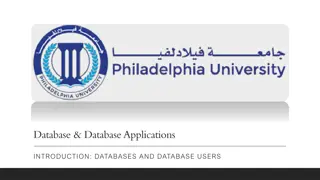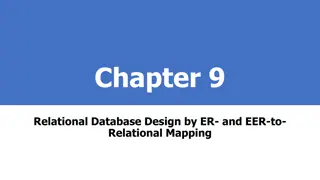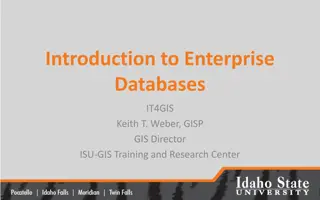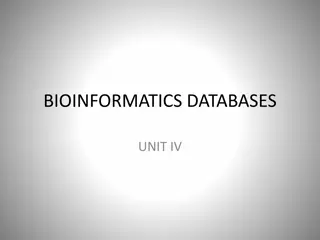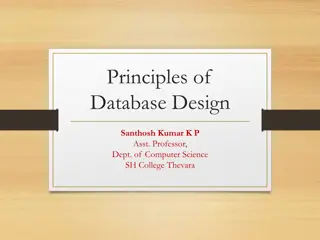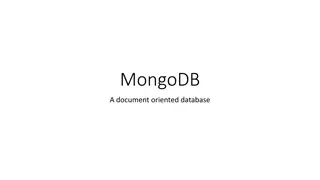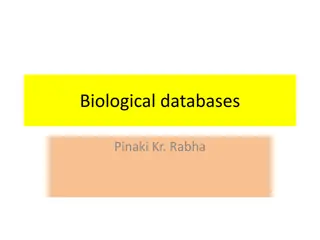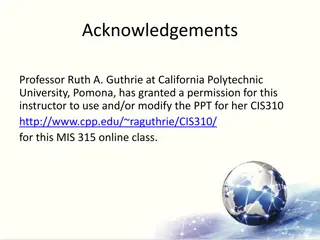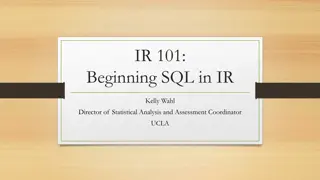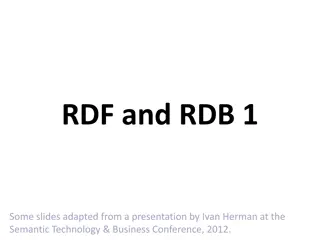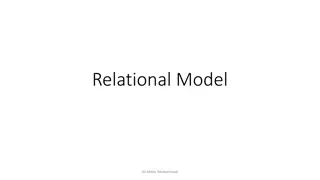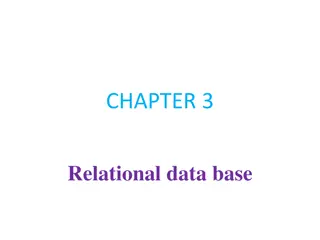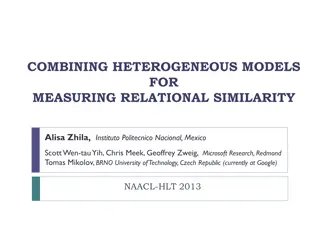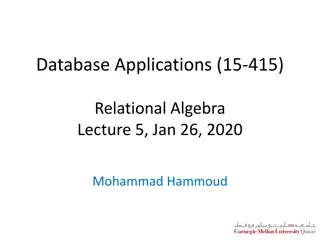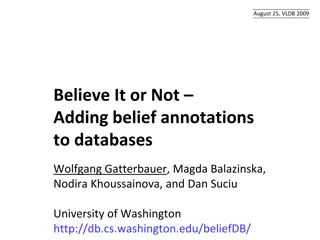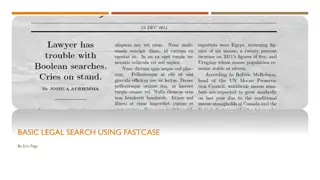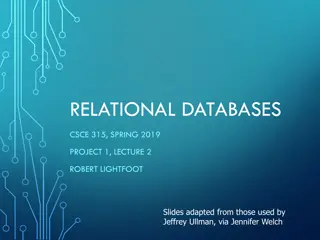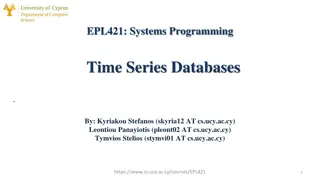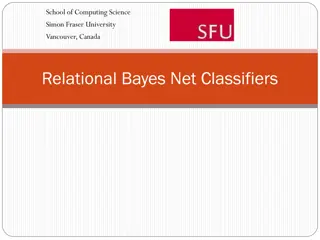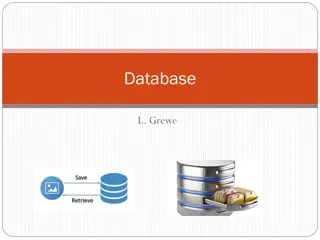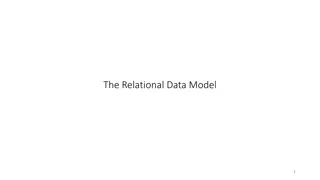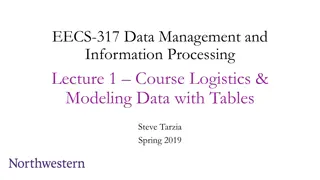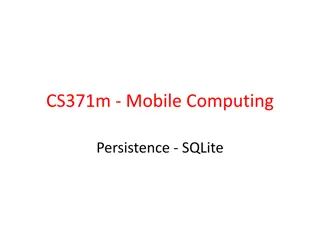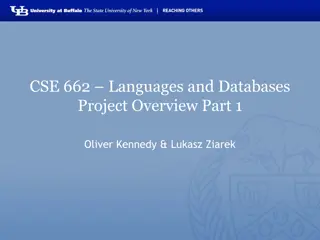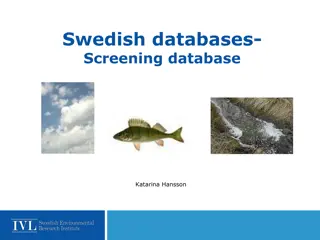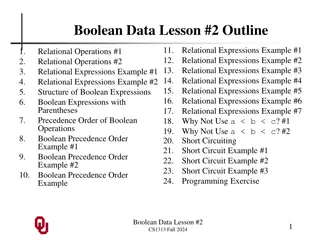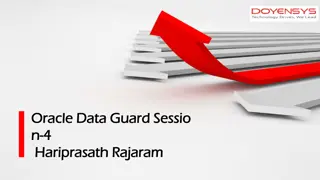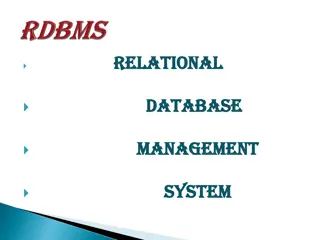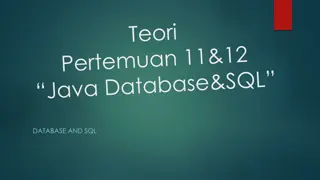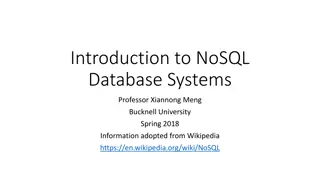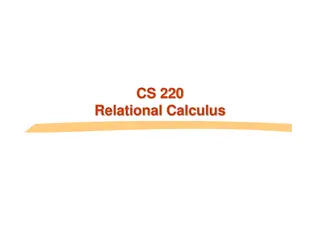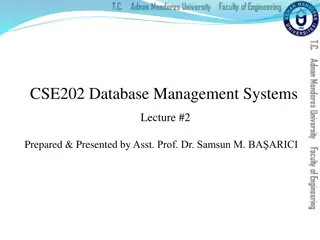Progressive Approach to Relational Entity Resolution
In this research paper authored by Yasser Altowim, Dmitri Kalashnikov, and Sharad Mehrotra, a progressive approach to relational entity resolution is presented. The study focuses on balancing cost and quality in entity resolution tasks for relational datasets. The goal is to develop a method that ac
1 views • 20 slides
Databases and Database Applications
Databases are collections of related data used to store known facts with implicit meanings in a structured manner. A Database Management System (DBMS) is crucial in managing databases efficiently by defining structures, loading data, manipulating content, ensuring security, and facilitating data acc
1 views • 15 slides
Relational Database Design and Mapping Techniques
Explore the process of mapping Entity-Relationship (ER) and Enhanced Entity-Relationship (EER) models to relational databases. Learn about relational model concepts, mapping algorithms, and the goals and steps involved in the mapping process. Discover how to preserve information, maintain constraint
3 views • 42 slides
Introduction to Enterprise Databases for GIS Professionals
Explore the world of enterprise databases through a GIS perspective with a focus on concurrent clients, database administration, creating databases/tables, checking service names, unique features, numeric data types, data type parameters in ArcGIS, and character data types. Gain insights into managi
1 views • 52 slides
Exploring the World of Bioinformatics Databases
Bioinformatics databases are essential tools in handling molecular biological data, classified into sequence and structure databases. Primary databases store raw data, while secondary databases contain curated information for research. Examples include GenBank, Protein Data Bank, and SWISS-Prot.
1 views • 38 slides
Database Design Principles and Management Overview
This document presents an overview of database design principles, including structured, semi-structured, and unstructured data types. It delves into the role of Database Management Systems (DBMS) in defining, constructing, manipulating, and sharing databases effectively. It also covers various types
0 views • 47 slides
MongoDB vs. Relational Databases: Myth vs. Reality in NoSQL Design
MongoDB is a document-oriented database that challenges traditional relational databases by offering flexible schema designs. While myths suggest no need for schema design or relationships in MongoDB, the reality emphasizes the importance of thoughtful schema design and choice in data relationships.
2 views • 21 slides
Keys in Relational Databases
Keys play a crucial role in relational databases by uniquely identifying records and establishing relationships between tables. Primary keys are essential for data integrity, ensuring each entity is identified uniquely. Learn about primary keys, types of keys, and examples of creating tables with pr
0 views • 57 slides
An Overview of Biological Databases in Bioinformatics
Biological databases play a crucial role in bioinformatics, storing vast amounts of data related to nucleotide sequences, protein sequences, and more. These databases are publicly accessible and essential for research in biological fields. Primary databases, such as GenBank, EMBL, and DDBJ, contain
1 views • 13 slides
Data Management and Databases
Explore the concepts of data, information, and knowledge, learn why databases are superior to spreadsheets for data storage, and delve into the organization and functionality of relational databases for decision-making purposes.
1 views • 18 slides
Introduction to SQL: Learn the Basics and Beyond
Explore the world of Structured Query Language (SQL) with this comprehensive guide. Discover what SQL is, its history, usage, and how to learn it on your own through free online tutorials. Understand the properties of relational databases and get insights into designing a relational database. With S
0 views • 29 slides
Exporting Relational Data to RDF: Strategies and Considerations
Explore the process of mapping relational data to RDF, including the choice of RDF vocabulary, defining mapping techniques, and exporting strategies. Learn about RDB systems that support RDF, direct mapping approaches, and the use of hybrid storage solutions. Discover how to bridge SPARQL and SQL fo
4 views • 13 slides
The Key Concepts of Relational Databases
Introduction to the fundamental concepts of relational databases including the relational model proposed by Edgar F. Codd, relation schemes, relation instances, keys for a relation, and more. Discover the significance of keys, candidate keys, superkeys, and primary keys in database design.
0 views • 27 slides
Relational Databases and File-Based Systems
This chapter delves into the fundamental concepts of databases, comparing them to file-based systems, and highlighting the significance of relational databases in modern integrated AISs. It explores the difference between logical and physical views of databases, introduces key concepts such as DBMS
1 views • 70 slides
Enhancing Relational Similarity Measurements: A Model Combination Approach
This study explores combining heterogeneous models for measuring relational similarity, showcasing the importance of general relational similarity models. It discusses the degrees of relational similarity and introduces a directional similarity model that outperforms previous systems. The approach l
0 views • 23 slides
Reactor: A Case for Predictable, Virtualized Actor Database Systems
Exploring the integration of actor programming models in modern relational databases to achieve high performance. The focus is on addressing challenges related to stored procedures, data partitioning, modularity, isolation, software engineering, and performance. The talk outlines motivation, the rel
0 views • 41 slides
Relational Query Languages in Database Applications
In this lecture, Mohammad Hammoud discusses the importance of relational query languages (QLs) in manipulating and retrieving data in databases. He covers the strong formal foundation of QLs, their distinction from programming languages, and their effectiveness for accessing large datasets. The sess
0 views • 39 slides
Many-to-Many Relationships in Relational Databases
Exploring the intricacies of many-to-many relationships in database design through the use of associative entities. Learn why a third entity is essential, how to create relational databases with foreign keys, and the importance of identifying relationships. Dive into MySQL Workbench symbols and the
0 views • 26 slides
Challenges and Innovations in Relational Engine Algorithms
Exploring the complexity of processing graph data in relational query engines, this content delves into the challenges faced, practices adopted in academia, and innovative solutions like LMS-NPRR, trie join, and specialized data structures. It discusses the difficulties in handling acyclic vs. cycli
0 views • 27 slides
Managing Belief Annotations in Databases: A Modal Logic Approach
Explore the concept of belief databases that enable data curation based on modal and default logic in a relational model. The work discusses managing inconsistent views in community databases and presents a motivating application scenario to illustrate the challenges and solutions in handling belief
0 views • 34 slides
Databases and Search Methods in Legal Research
Dive into the basics of legal search using Fastcase, exploring the concept of databases, integrated vs. non-integrated content, indexed and full-text databases, along with examples and the benefits of natural language searching in legal research. Gain insights on the types of databases, how informat
0 views • 20 slides
Advanced Techniques in Relational Data Outlier Detection
This document delves into cutting-edge methods for outlier detection in relational data, focusing on profile-based and model-based approaches such as leveraging Bayesian networks, feature generation, and individual feature vector summarization. The examples provided showcase the application of these
1 views • 30 slides
Stored and Inherited Relations in Relational Databases
Explore the concept of Stored and Inherited Relations (SIR) in relational databases, as discussed by Witold Litwin at Dauphine University. Discover how a typical scheme of a stored relation defines a natural SIR, leading to more efficient query formulations and less procedural querying processes. Le
1 views • 27 slides
Fundamentals of Relational Databases in CSCE 315 - Lecture Highlights
Introduction to relational databases covering topics such as relational data model, schemas, converting from entity-relationship model, entity sets, relations, relationships, combining relations, and practical examples. Learn about storing data in tables, attributes, database organization, and the i
1 views • 18 slides
Enhancing Spatial Data Analysis in QGIS
Explore the integration of relational databases with QGIS to facilitate efficient spatial data analysis. Discover the importance of recognizing spatial relationships within data sets and the solutions to enhance QGIS for relational datasets. Overcome challenges and delve into the intersection and su
0 views • 25 slides
Overview of Time Series Databases in Systems Programming
This content delves into the intricacies of time series databases within the realm of systems programming, comparing options like InfluxDB. It discusses relational vs. tagset data models, setup procedures, API usage, security considerations, advantages and disadvantages of relational data models, an
0 views • 82 slides
Relational Bayesian Networks in Statistical Inference
Relational Bayesian networks play a crucial role in predicting ground facts and frequencies in complex relational data. Through first-order and ground probabilities, these networks provide insights into individual cases and categories. Learning Bayesian networks for such data involves exploring diff
0 views • 46 slides
Database Management Systems and Data Storage
Explore the world of Database Management Systems (DBMS) and learn about the evolution of data storage from flat-file to relational databases. Discover the key features of a DBMS, different database types, administration tools, SQL and NoSQL databases, CAP theory, and considerations for choosing betw
1 views • 32 slides
The Relational Data Model and Database Concepts
Delve into the world of relational data modeling, database integrity rules, and structure. Explore how a university database in MS Access utilizes relational tables and fields to store information. Learn about the key terminology associated with relational databases, such as primary keys, foreign ke
0 views • 69 slides
Handling Complex Data with SQL Databases: A Powerful Foundation for Data Science
Learn how to manage real-world, complex data efficiently using SQL relational databases. Explore the limitations of Excel and Matlab in modeling data relationships and data integrity enforcement. Understand the importance of keeping data and analysis separate. Delve into examples of data sets beyond
1 views • 34 slides
Introduction to Relational Databases and SQLite for Mobile Computing
Covering the basics of relational databases, SQL, and SQLite, this content provides an overview of database management systems, their history, and the key concepts related to data storage and retrieval. It also touches on the practical aspects of working with SQLite in Android applications, outlinin
2 views • 61 slides
Database Benchmarking: Embedded Databases Comparison
This project involves benchmarking lightweight embedded databases like SQLite, BerkeleyDB, and others. Students will evaluate and compare these databases using specific workloads to analyze their performance. The outcomes include a detailed report on each system's strengths and weaknesses. Required
0 views • 19 slides
Environmental Monitoring and Screening Databases in Sweden
This content delves into the monitoring and screening databases managed by Katarina Hansson at IVL, focusing on chemicals, emissions, and national environmental data in Sweden. It covers the use of national databases, biota databases for pollutants in biological samples, and screening studies involv
1 views • 10 slides
Relational Operations for Boolean Expressions
Learn about relational operations in Boolean expressions through examples and explanations. Discover how to compare numeric operands to produce Boolean results, covering equal to, not equal to, less than, less than or equal to, greater than, and greater than or equal to operations. The content inclu
0 views • 25 slides
Oracle Data Guard: Training Objectives and Far Sync Instances
This content highlights training objectives for Oracle Data Guard, focusing on the new features such as Far Sync Instances and Active Standby Databases. It covers configuring Data Guard Broker, plugging Pluggable Databases, recovering Standby Databases, and achieving a highly available Oracle Databa
0 views • 25 slides
Evolution of Database Management Systems
The evolution of Database Management Systems (DBMS) began with file systems and punched cards in the 1950s, followed by hierarchical and network models in the 1960s and 1970s. The 1980s introduced relational databases like Ingres, Oracle, DB2, and Sybase. The 1990s saw the rise of object-oriented an
0 views • 31 slides
Databases and SQL: A Comprehensive Overview
Databases are fundamental in computer-based record-keeping systems, essential for organizations to maintain and access crucial information efficiently. This comprehensive guide covers the significance of databases, advantages of centralized databases, database models, relational databases, and more.
0 views • 52 slides
NoSQL Databases in Modern Data Management
NoSQL databases offer innovative storage and retrieval mechanisms for diverse data types, deviating from traditional relational databases. This article explores the history, definition, advantages, challenges, and types of NoSQL databases, shedding light on their pivotal role in current data managem
0 views • 11 slides
Introduction to Relational Calculus and Algebra in Database Management
Explore the fundamental concepts of relational calculus and algebra in the domain of database management. Understand the differences between declarative and imperative query languages and learn to retrieve information using practical examples and theoretical frameworks such as tuple relational calcu
0 views • 23 slides
CSE202 Database Management Systems
The basics of relational algebra and calculus in database management, covering unary and binary relational operations, query examples, tuple and domain relational calculus. Explore the set of operations and declarative language used for specifying relational queries.
0 views • 45 slides

